(In this post we present BadWolf’s interview with Tomas Lindberg of Lock Up, Disfear, and of course At the Gates, whose comeback album At War With Reality is headed our way in October)
“We still have a sense of urgency.”
That’s what Thomas “Tompa” Lindberg, vocalist of Swedish death metal legends At The Gates told me in between vocal takes as he called No Clean Singing from the studio. Now that At The Gates have finally released the cover art for their upcoming album At War With Reality, their first in 19 years, Lindberg is ready to talk—about finding his screaming voice, his political views, and the magical realist literature that has informed his new work.
So, you’re in the studio right now?
Yeah.
How’s it going?
Very well. All the drum tracks are totally done, and guitar tone is set and Anders has done the long song. We’re going to do guitars on one song, then I’m going to do vocals, because we do the whole setup so I can alternate so I don’t burn out the voice. You know, we’re going to have the first song written, really, finished today.
It’s good that you’re taking care of your voice, because I saw you at MDF and I have no idea how you can do what you do for an entire hour.
Me neither. Sometimes, life is a bit of a struggle, but it’s intense live because then no one can really . . . you can’t rewind and listen to it again. Well, you can on YouTube. In the studio, you need to be perfect 100%, all the time.
How did you find your voice? Your screaming voice.
Well, I don’t know. It’s been kind of going through different periods. When I was in . . . back in the old stuff, it kind of came on between the Grotesque albums and the At the Gates stuff. Each album has its own vibe. Really, it’s more like . . . I guess they’ve melded together into what I have today, but now 20 years later, the voice is a little bit lower. So, it won’t be as screechy I guess. You know, you start to just sing along to your favorite records in your bedroom when you’re 16, and your favorite records are all Possessed and Slayer and stuff like that. So, it came naturally I guess.
Your voice is very unique. It seems like you don’t use the exact same technique as a lot of other old-school death metal singers. Even if your voice has gotten lower, but it still doesn’t seem like you’re trying to be low so much.
Oh, yeah. I mean, the low stuff comes now more naturally with age I feel. The voice has grown into that. But at the start, it’s more . . . I guess more attitude and desperation than control back in the old days. That kind of melded into how people see me as a singer. That’s why I do this. I mean, Frederick said to me “You don’t have to be at volume all the time,” but I can’t really go back. I’m not doing full volume! Some singers can hold back and have more control, but that would be to relearn something that I learned 30 years ago.
Okay, so where is the album being recorded right now?
We’re at the Fredman Studios in Gothenburg.
So, you’re sticking with your hometown?
Yeah. Because then only two of the guys had to travel, and we can record in the evenings and record on the weekends and stuff like that. So, we save a lot of time, so we can do more. We have the same amount of time, but we don’t have to burn ourselves out.
So, you still live in Gothenburg?
Again, yeah. I moved back like six years ago.
So where did you live when you didn’t live in Gothenburg?
I lived in a small, small town on the east coast actually,Västervik, which isn’t famous for anything except for some tennis players [and one member of ABBA!—BadWolf]. But, it’s a really mellow, small town. The one thing is I had some family there when I was at the university. So, that’s nice. But it’s good to move back home and be ourselves, you know?
Why’d you move back?
A lot of reasons. Work, family, our parents aren’t getting younger so we stay closer to them. Also, the music scene, of course. You know, you have more contacts here; you have overall friends. You have connections with projects and stuff like that. Not much was happening there. It took a while to go into that bubble, to isolate yourself. But in the end, human beings need company.
Out of curiosity, what did you study in university?
To become a teacher. I got a university degree in teaching, and one in social studies.
Social studies?
Yeah. Right now, I’m a middle and high school teacher in social studies and English. To be able to teach that to kids, you need a university degree.
It makes so much sense that that’s what you would teach. Especially considering your other vocal work. I don’t just love your work with At the Gates; I’m a really big fan of that Disfear record you did. It has some sort of political undertones to it a little bit. And I was wondering if any of that is going to be coming into the new At the Gates record?
Well, I would say not on that conscious, obvious level, for example the Disfear record or something like that. But, of course, it’s written by me and I’m a political person, but we’ve never really been a political band. It’s more abstract and sort of philosophical. But, of course, my view does go into that, which is a bit of blistering attitude, as always. I mean, you can probably trace that if you want to, but it’s not as obvious as with Disfear.
If you look at your career in-between At the Gates records and your stuff with Disfear and Lock Up, it seems like punk rock is very close to your heart. In America, at least, punk rock always seemed like political first and foremost to me when I was growing up.
Yeah. I mean, it is for me, too. But it’s probably the whole attitude. Back in the day when I was just a metalhead, when I was growing up, I didn’t really care that much about the lyrics. They had to be cool, and you know, all the death metal bands and early thrash bands had cool lyrics. When you started to understand there was other hard music, like early ’80s hardcore music like Discharge and other d-beat bands, you start to realize there is also a message in the lyrics. Those early punk rock records honed me into the person I am, politically and philosophically, today I guess. I learned from those ’80s records. It developed due to maturity and has grown deeper, but they’re still the same convictions all the way down in me.
photo by Daniel Falk
Well, give me a brief overview? In your own words, what are your beliefs?
I tend to agree with socialists. Solidarity is very important to me, so I guess that makes me a socialist. Also, as I’m very interested in social studies and politics and political theory, I base a lot of my views on theories which usually trace back to Marx, basically. His way of explaining the model is very understandable to me. It makes the most sense. So, I guess that makes me pretty left wing. We care about the small guy, and globalization has gone too fast and maybe gone too far at the moment in all things, really. There can be some dark viewpoints that in most cases stretch around your cultural circle or social circle. To be able to embrace globalization on a more . . . I would say like a soft development, like not only the hard development, which means economical growth and stuff like that, but also growth in human values, that’s what I see today. That’s my viewpoint, I guess, in short.
When I was growing up, even before I listened to At the Gates’ music, I would listen to Metallica and Megadeth and a lot of that music to me did seem to have kind of a left wing social bent to it as well. But lately, it seems like there has been a of kind of resurgence in nationalism in the metal scene. More so the black metal dudes, obviously.
Yeah. Some of those things only seem left-wing. I’d have to say with Metallica, they were probably more like fuck everything. We know Mustaine sometimes seemed like a left-wing guy, but know now that he was a full-blown right-winger. Yeah, you have to really structure your beliefs around some sort of theory and ethics and base it on not just what it feels like, but you have to understand why it’s like it is as well, to have a standpoint to argue with people about it.
Of course, in the metal scene, that’s to say there are some assholes. But to a certain extent, I would say that’s a small percentage. Then there’s a large percentage in the middle that don’t really give a fuck. You know what I’m saying? They’re just ‘yeah, this sounds cool.’ You try your hardest to be very artistic, and blend some of your beliefs into what you do. Half the people won’t notice it, but they’ll still think it sounds cool.
So, what does the title of the new record mean to you? At War With Reality. That’s part of why I asked the political question, because that title also seemed to have some sort of underpinnings to it.
It is actually more . . . there should actually be a lot of politics in that, too, but as I said it’s more philosophical. It’s more back to a specific . . . it’s not only being one reality. You know, there cannot be only one way to see the world, and we have to go outside ourselves to be able to see. I mean, here in Europe we are standardized in our thinking, you know? All the maps start in Europe and we’re in the middle. It’s a title which springs from literature, and it’s a very avant-garde record in that way, but it can be perceived in different ways.
On the surface, for the people who just want to listen to it and not really have to think too much, it works that way, and then you can dig through more layers with an understanding of the lyrics. At the bottom of it is this multiple reality. You know, this kind of idea that you can create your own version of the album as well, basically. I don’t want to give too much away, but it’s based somewhat around a South American writer in the ’60s, so it’s part of this magic realism way of writing . . .
Gabriel Garcia Marquez?
Yeah, stuff like this. So, it’s around those parts. It mixes reality with what you would call alternate reality. And even though you’re moving in the dream world or the real world, or this is my perception and this is his perception, and it’s very abstract. It makes sense, but the music paints the same picture as you paint with the words, really. So, it’s a creative album in that way. It has some standpoints, but the reality’s not . . . you know, “Oh, whatever, life is so hard. Fuck reality.” It’s not as simple as that.
I’ve got to tell you, when I woke up ten minutes ago, I didn’t think that we would be talking about magical realism in this interview. That’s quite the curveball.
That’s why it’s not really an obvious political album, but it does have some political undertones. That’s why those writers had ways of mixing in their concrete political history into those more abstract novels, so it could be read as political literature if you see it that way. That’s what I’m working with, basically.
I’m half Latin-American. I’m half-Brazilian. I mention that because I always felt when I studied magical realism in school, that the style of writing was so rooted in those post-colonial cultures.
Yeah, yeah. Exactly. And it was written by some South American writers. It’s interesting that didn’t happen in Europe or North America.
Well, the reason it’s interesting to me is we’re relating it back to At the Gates, and your music to me seems kind of quintessentially Swedish.
Well, maybe. Yeah. I guess you can’t really hide that. Yeah.
I mean, the more I’ve listened to, for example, Slaughter of the Soul, the more some of those melodies to me have reminded me of more traditional music from Sweden. Is that conscious or unconscious?
I think more unconscious, actually. I think there’s the Swedish melancholy there, but it’s not really very conscious. That’s how the twins write. That’s who they are. And together, we’ve created this productive year. Mainly, me and Anders have worked for over a year now. It was in the early stage, I was still thinking of where to go with it. You know, where are we, mostly from my standpoint? Should we try to create an album that is a mix of other stuff? Do people want to hear about new topics?
That’s what creatively happens. Then I expand upon the idea of how this magical realism and all that, how that works in death metal. To be abstract, it’s very . . . occult sometimes, you know? It blends perfectly. And at the same time, Anders was going into these melodies and having to create it himself, and you don’t have to think too much about the perception of the album. You can just run with it and create another At the Gates album, you know? Because if you look at all the different At the Gates albums, they are different. None of them is the same. And this is another one. So, it’s just a continuation, you know.
Yeah, and when I spoke with Anders, because I spoke with Anders at MDF, he talked about that. He talked about that Swedish melancholy, and he talked about a sense that . . . I mean, I’m not trying to speak for him, but I did get the sense that he thought that At War With Reality would be kind of a sadder album.
Definitely. Yeah, yeah. It’s more of an angry album, yeah. I would say so. It has definitely more depth than Slaughter of the Soul, which was a more direct and aggressive album. It has some of that other stuff that came up on With Fear and Terminal, but not to the extent that we have now. It could be the follow-up to Terminal Spirit Disease more than Slaughter, but I mean of course, the playing is more on the same level as Slaugther of the Soul and so is the production. So, it will be a mix of those two, mostly I guess.
When you’re writing these lyrics, are you coming from that same sort of melancholic place?
I would say it’s varied. I write the words that, you know, I relate to the song. It sounds very pretentious, but the notes and the words are together. The words I’ve written fit to these songs. I can’t move them around, really. So, they become what they are, and together they create a picture. Maybe Anders is more melancholic as a person, maybe as well I’m more energetic, and together that creates another entity. Of course it’s melancholic, but it’s never laid back. It’s in your face at the same time. So, it’s a mix, but of course it’s a darker album. I think it’s the darkest album we’ve done since With Fear.
You don’t strike me as a very melancholic person right now as we’re talking, or even your live performance.
It’s different settings, I guess. The live performance is full of adrenaline I’m getting from the fans, from the people in the audience. A lot of the old songs have so much aggression. These songs have too, but it’s more that this has a different switch to it. But I would say you have to have different elements and mix them together in the best melody. You can’t go be angry or happy-go-lucky all the time. You have to balance that.
So, to be able to create what we create, we have to be able to fool around and be silly as well in the studio, as other bands do, to be able to create this more authentic, melancholic piece. And at the same time, we’re not just one person.
I’ve spoken with some people before that seem like, sometimes it’s a bit harder to find those emotions, that energy, the older you get. Do you find that that’s true, or no?
Well, you analyze more, I guess, when you get older. Especially before you press “enter” on an angry email, you think twice nowadays, and it’s the same thing with everything in life. You’re able . . . you make sure to think twice about stuff. But the stuff that’s still in the songs, the stuff that still pisses you off or is upsetting to you, that’s the important stuff; that’s the real stuff that you have to work with. In the lyrics and in the music, there are lots of things you have to deal with and find outlets for them. But, that’s why we do this. That’s why it’s important for us.
As it was in ’95, when we were very upset with the metal scene, that nothing was happening and it’s all plastic, it’s kind of like the same now. There’s a lot of plastic music out there. I believe there is still a need for us in that way, in that sense, because we still have a sense of urgency.
********
At War With Reality is due for release by Century Media on October 27th in Europe and October 28th in North America. At the Gates’ Facebook page is here.

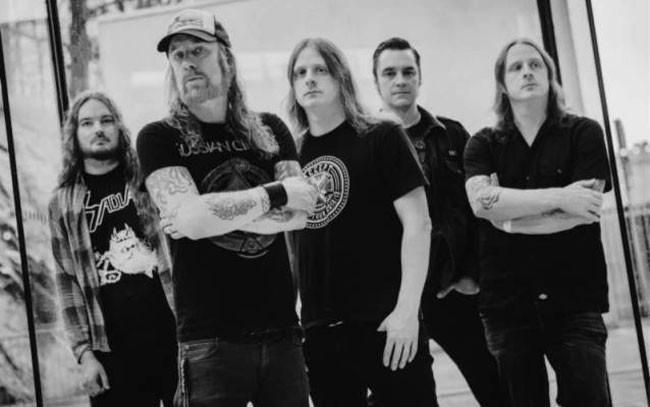
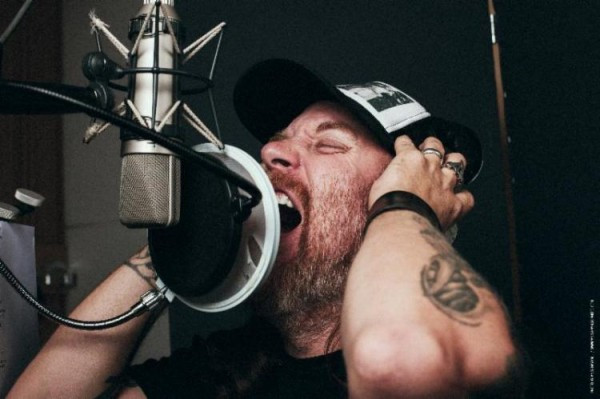
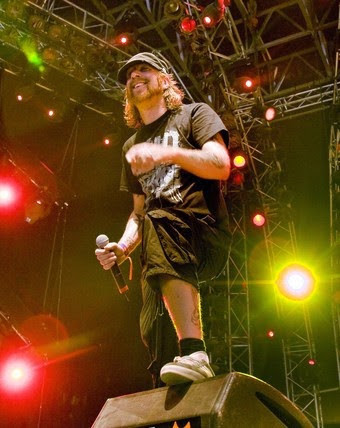
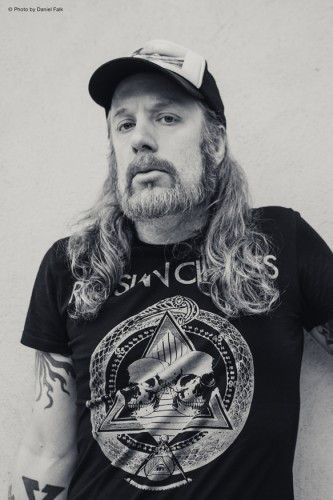
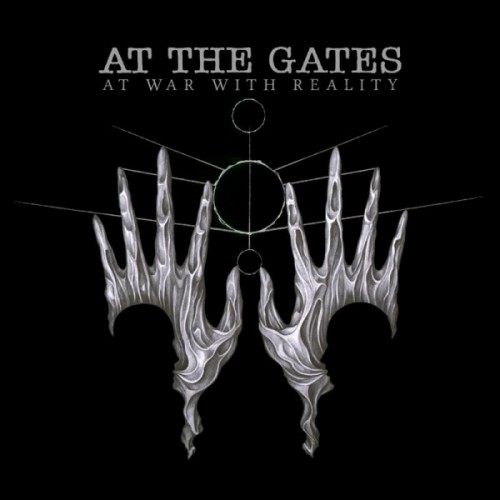
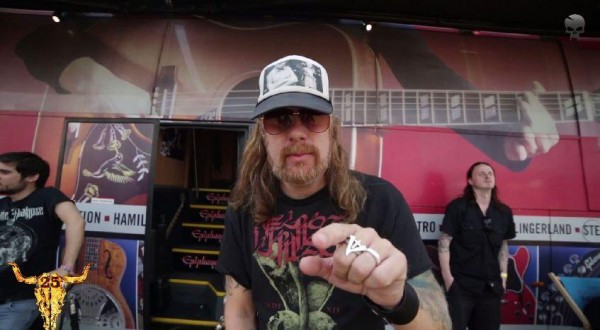
!m!
Great interview, very interesting!
Definitely a great interview. Can’t wait for this almost-birthday present
I finally got around to reading this. A good interview with really interesting topics and answers.
Marx, Márquez, Melancholy, Metal = MASTER. Unpretentious art. What an interview!
Nationalism is how bad¿?